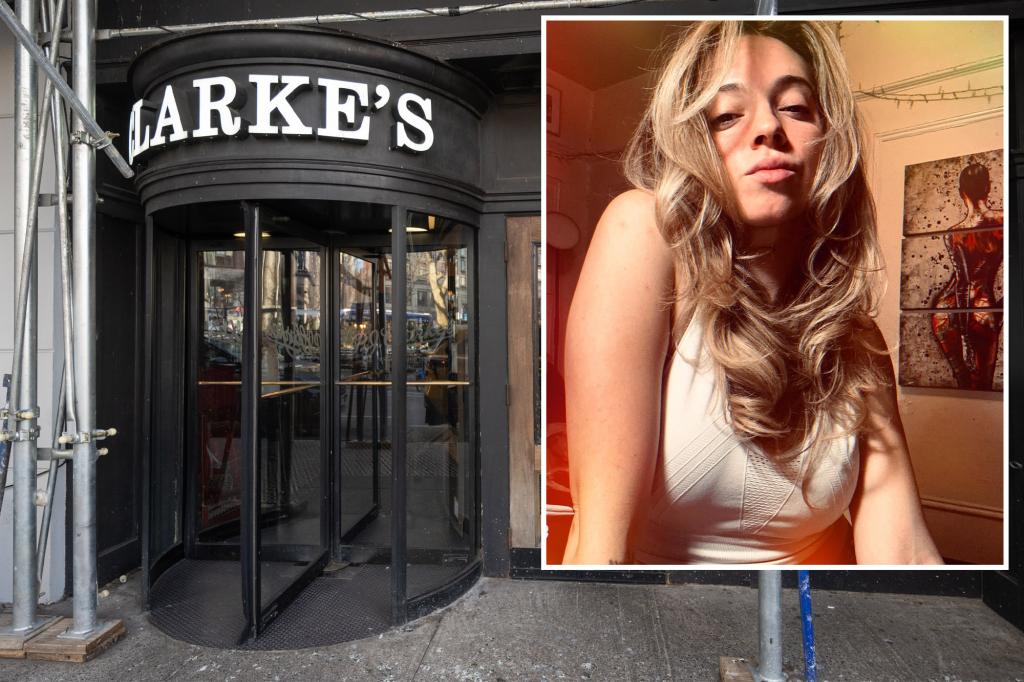This lawsuit unfolds a narrative of alleged sexual harassment and assault within the esteemed walls of P.J. Clarke’s, a century-old bar and grill, shaking the foundations of its seemingly respectable facade. Amber Daza, a 31-year-old bartender at the Lincoln Square location, has bravely stepped forward, accusing her former supervisor, Kairsten Nunn, of subjecting her to unwanted sexual advances, culminating in a disturbing incident of alleged assault. This detailed account paints a picture of a toxic work environment, where power dynamics were allegedly exploited, and professional boundaries were grossly violated.
Daza’s complaint details a pattern of escalating harassment, beginning in April with Nunn’s persistent attempts to cross the line from supervisor to something far more inappropriate. Nunn allegedly visited Daza’s apartment, insisted on staying overnight, and made suggestive comments, creating an atmosphere of discomfort and unease. These actions, seemingly designed to blur the lines between professional and personal, escalated to a disturbing incident on Mother’s Day when Nunn sent Daza $30 for a gift for her mother, a gesture Daza promptly rejected. This act, while seemingly innocuous on the surface, further underscores the blurring of professional boundaries and the creation of an uncomfortable dynamic between the two.
The situation took a dramatic turn during a meeting in May, where Nunn, allegedly intoxicated, made overt sexual advances toward Daza. The suit alleges that Nunn questioned Daza’s marital status, inquired about her sexual experiences with women, and then physically grabbed Daza’s neck and attempted to kiss her, leaving a bruise as evidence of the unwanted physical contact. This incident, a clear escalation of Nunn’s alleged inappropriate behavior, transformed the harassment from verbal and suggestive to physical and assaultive. Daza’s clear and repeated rejections, expressing her discomfort and requesting respect, were allegedly ignored by Nunn, demonstrating a disregard for Daza’s personal boundaries and autonomy.
The aftermath of the alleged assault was marked by apologetic texts from Nunn, acknowledging her transgression and blaming the alcohol. However, these apologies did little to mitigate the damage inflicted upon Daza. She subsequently filed a police report in June and an Equal Employment Opportunity Commission complaint in July, formalizing her accusations and seeking redress for the alleged harassment and assault. These actions, taken by Daza to seek justice and accountability, represent a pivotal point in the narrative.
Following her complaints, Daza alleges that she faced retaliation in the form of less desirable shifts and withheld tips, creating a hostile work environment and further compounding the harm she experienced. This alleged retaliation suggests an attempt to silence Daza and punish her for speaking out against the alleged harassment. Adding to the unsettling narrative, colleagues reportedly informed Daza of Nunn’s alleged desire to “ruin” her marriage, painting a picture of a supervisor motivated by malicious intent.
The lawsuit expands beyond Daza’s individual experience, alleging that Nunn engaged in sexual relationships with other subordinates, offering preferential treatment in exchange for sexual favors. This pattern of alleged behavior paints a picture of a systemic issue within P.J. Clarke’s, where sexual harassment was allegedly tolerated and even enabled. The suit further alleges that human resources and Daza’s other managers were aware of Nunn’s alleged behavior but failed to take appropriate action, creating a culture of impunity and perpetuating a hostile work environment. This alleged inaction by management not only failed to protect Daza and other employees but also suggests a broader failure to address and prevent sexual harassment within the organization.
Daza’s lawsuit seeks unspecified damages, not only for the alleged harassment and assault but also for the emotional distress, professional repercussions, and hostile work environment she endured. The suit names Nunn, P.J. Clarke’s Lincoln Square, and its management company, SLH Management, as defendants, holding them accountable for the alleged harassment and the subsequent retaliation. While Nunn has since resigned, the lawsuit highlights the alleged delayed intervention by P.J. Clarke’s, which allegedly allowed the harassment to continue and fostered a toxic work environment. This delayed response, according to the suit, subjected Daza and potentially other employees to continued harassment and created a culture of fear and intimidation.
This case shines a light on the pervasive issue of workplace sexual harassment and the courage it takes for victims to come forward. Daza’s story serves as a reminder of the importance of creating safe and respectful work environments, where all employees are protected from harassment and retaliation. The outcome of this lawsuit could have significant implications for P.J. Clarke’s, its management company, and the broader restaurant industry, potentially forcing a reckoning with workplace harassment and the need for stronger protections for employees. By seeking justice, Daza is not only fighting for her own rights but also advocating for a workplace free from harassment and discrimination, where all individuals are treated with dignity and respect. This case underscores the importance of accountability, not only for the perpetrators of harassment but also for the organizations that allow such behavior to flourish. The legal process will determine the validity of the allegations and the extent of the damages awarded, but the impact of this case extends far beyond the courtroom, sparking a conversation about power dynamics, workplace culture, and the urgent need to create truly safe and equitable work environments.

